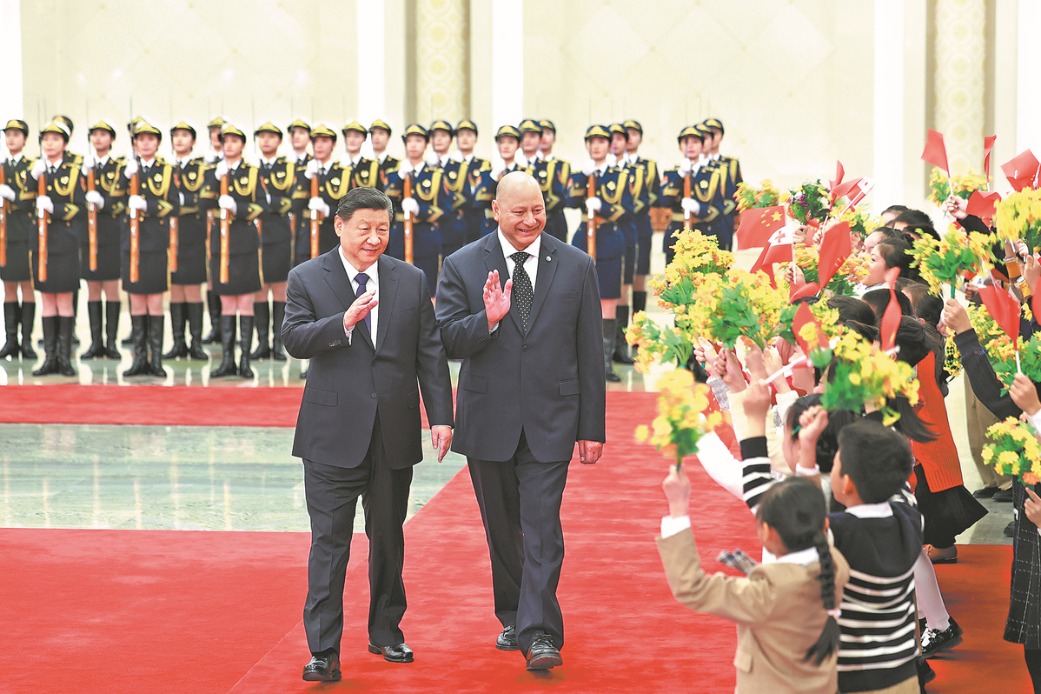Why the West is wrong about China

| Frederico Congolo says African countries can learn from China's opening-up policies and special economic zones. Wang Chao / China Daily |
Africa is part of going-global strategy, not a target for colonization, says expert
Frederico Congolo, a lecturer and researcher at the Higher Institute of International Relations in Mozambique, believes it is wrong to call China a neo-colonizer, an accusation that he says is formulated by Western countries, most of them being former colonizers.
Congolo was born in Gaza province of Mozambique and received a university education from the institute at which he now teaches. Later he gained a master's degree at Jilin University in Changchun, Northeast China.
He is a lecturer of Asian studies, specializing in Chinese foreign policy.
Congolo's connections with China go back to his college years when he saw kung fu movies and ate Chinese food. When he was writing his thesis, he went back to Gaza on holiday, he says.
"When I was on the beach I went to a small shop to buy souvenirs, where for the first time I saw four Chinese people, even in that remote place. Later I saw Chinese companies building roads and dams in Africa, and everybody was talking about China. I realized it was a good topic to study."
Congolo says China's relationship with Mozambique is intricately linked with its engagement with the whole of Africa.
As with China's going-global strategy, Africa's strategy is multidimensional, he says. It is using diplomacy, economics and culture to promote national interests.
But China's increasing presence in Africa does not mean it is colonizing Africa, Congolo says.

"First, it is not academically reasonable to call China a neo-colonist, because you have to be a colonizer first to be a neo-colonist. In history, China never colonized any countries in Africa.
"Second, it is not targeting Africa particularly, but just treating it as part of its going-global strategy. Now China is buying world-class brands like Volvo in Europe and buying huge coal mines in Australia. If Europe and Australia still need Chinese money, Africa also needs Chinese money."
It is not only China that is investing in Africa, he says. The other countries are doing the same thing.
"But why do people talk so much about China's neo-colonialism? Because China is too important to be ignored. Who is talking about that? The former colonizers."
Congolo's observation is backed by a study by Alemayehu Geda, professor of economics at Addis Ababa University.
"The conclusion one would make from all the media coverage and even the views of ordinary people is that China is this huge foreign investor. Yet 90 percent of the (cumulative) foreign direct investment into Africa is still from the West, the United Kingdom, France and the United States. China's contribution is actually quite small. China combined with India is less than 6 percent."
Nowadays, the exercise of power has dramatically changed, which poses a threat to former colonizers' interests in Africa, Congolo says.
"Africa is now facing a much better world political environment because the power has redistributed. The political agenda Western countries used to impose on Africa has reduced, not only because of China but because of the new world order. The rise of China, India, Brazil and Russia has brought a democratized international environment.
"Today world power is divided; no one owns power. Western countries are still important pillars of industry, but it has changed from 'Who is leading?' to 'How much is it leading?'"
The rise and fall of the manufacturing hub can explain this phenomenon very well, Congolo says. Half a century ago, the main industrial hub was the West, so Westerners demanded free markets because they were the only people who had the technology and products to sell to the world.
"But in the past 20 years, you didn't need to have gone to Europe to see huge, complex industries. You see them in China, India and Brazil. Everyone is in the game. Now Western countries are talking about quotas and various business barriers."
Apart from the improved political environment, China's approach to African countries makes sense, Congolo says, adding that African countries are much more amenable to the Chinese approach.
"They come and ask 'What do you want?' instead of 'I think this is your priority', like many Westerners did throughout history. We know China has its national interest, but at least this is a good way of doing business."
Congolo cites as an example African governments treating housing and hospitals as priorities. The approach of Western governments is "I can give you the money, but you can only use it on the areas I think is important", he says.
However, the Chinese approach is "What do you need?" When the reply is "housing", the response is: "OK, but that comes with a price."
Congolo says it is understandable that people have to pay for their needs.
"At least we have achieved our priority. By this different approach, China is conquering Africa without shooting a bullet. This is shaking the Western paradigms of expansion and development."
Another important difference is that there are no political conditions attached to such business, he says.
"Historically, if you seek help from Western countries, there are many terms on political reforms. I admit government institutions are important, but that's not enough to feed the people or to accommodate the homeless. Throughout African history we have had kingdoms and chiefdoms, but the natural political evolution was interrupted by the colonizers."
Western systems may not apply to African countries, he says, and Africa should not follow a so-called Chinese model either, he says.
"No Chinese leaders ever talk about the 'Chinese model' or the intention to transfer it to other countries. It is wrong to implement the Chinese way of development if you are not in the Chinese context."
African countries cannot just cut and paste Chinese experience, Congolo says. "What we should learn is the attitude to find the right solution for ourselves."
But some successful ideas such as opening-up policies and special economic zones are worthy of emulation, he says.
African countries also need to work closely, he says.
"There is talk that the 21st century is a century of continental states. For example, if we look at China and the US, their economies are so large that European countries can only confront them as a whole."
Contact the writers through wangchao@chinadaily.com.cn
(China Daily Africa Weekly 05/02/2014 page32)
Today's Top News
- International community should work together to confront root causes of Palestinian question
- At least 13 dead as major fire engulfs HK apartment blocks
- Lai's actions reveal flattery of Japan and betrayal of Taiwan, mainland says
- Xi extends congratulations on Intl Day of Solidarity with Palestinian People
- Foreign biz circle bullish on China's opening-up
- Era of China being bullied long gone































